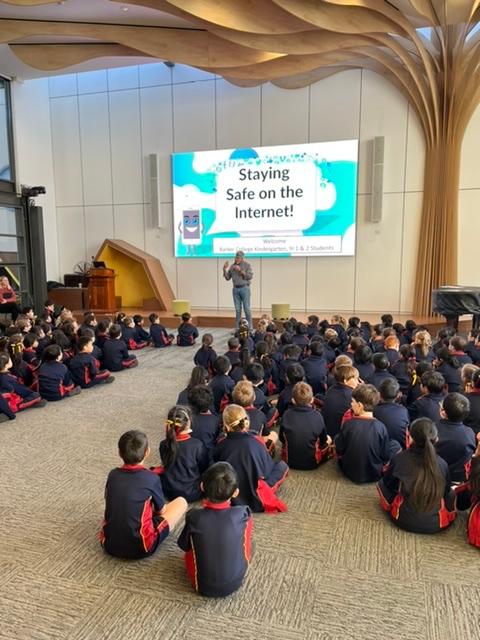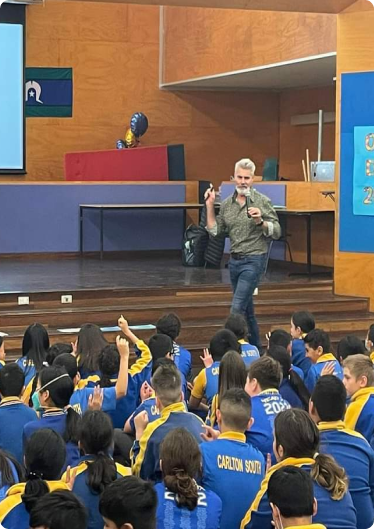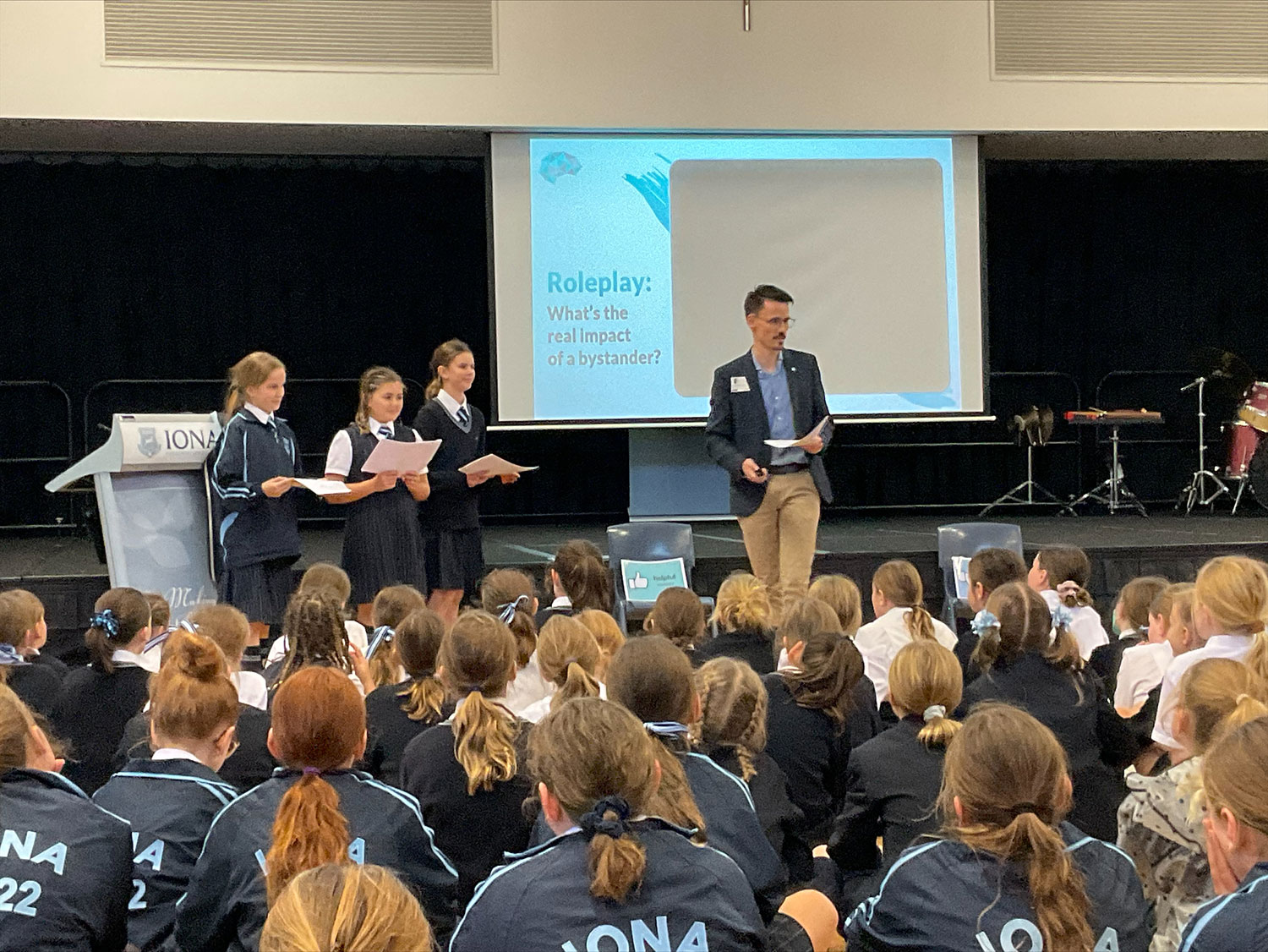Online Safety Education Sessions for Primary Students
Developed by our award-winning team, our student education sessions are dynamic and engaging, teaching students in an interactive way how they can make cyber-smart choices.
About the Sessions
Our Kindergarten - Year 6 sessions have been developed to educate students about the fundamental components of cyber safety. We offer developmentally targeted sessions which address key cyber risks, and build capacity in young people to navigate the digital platforms they encounter.
We emphasise the constructive relationship children can have with technology under our positive digital citizenship ethos and up-skill students in understanding the importance of online safety and ways to implement safe online practices.
.png?width=1410&height=1182&name=ySafe%20Website%20Graphics%20(21).png)
I found the sessions really helpful and fun, and thought they related to me on all levels.
Online ‘Stranger Danger’ and Catfishing
We explore the many types of people on the internet and highlight the need to think critically about who you talk to, motivators behind online contact, and ways to verify someone is who they say they are (catfishing for older students only).
Protecting Personal Information
We discuss what information is safe and unsafe to post online, and the unexpected outcomes that can occur when we post something we shouldn't. We also cover the importance of good digital hygiene, and ways privacy and security settings can help keep people safe.
Cyberbullying & Online Etiquette
Focusing on SEL outcomes, we teach students how to recognise and anticipate negative online behaviours, and outline strategies for managing cyberbullying and seeking help.
Staying Safe Online
We cover additional strategies for staying safe online, including safe online gaming practices, geolocation tracking and age restrictions on social media.
Our foundation sessions cover a range of topics in a fun, innovative and impactful way
Designed to stand out from your typical cyber safety presentation, our sessions are visually engaging, dynamic, and interactive.
Our primary sessions not only deliver crucial lessons in online safety but empower the next generation to consider how they can take the lead in enhancing education and behaviour within their own digital communities.
Foundation Session Overview
The session focuses heavily on story-based learning activities for younger audiences. Introducing the concept of the internet and its interconnectedness, students learn about the challenges, risks, and benefits of using technology in their everyday lives. Delivered with the pro-technology ethos, students also learn the foundational concept of personal private information with an intentional focus on students' identification of safe, trusted adults and help seeking behaviours.
Key themes discussed in this session:- Safe people and places
- Personal private information
- Help-seeking behaviours
Incorporating the trending games and websites kids use with a focus on presenting cyber safety themes using a game-based delivery. This session is interactive, engaging, and full of practical strategies students can apply to real-world scenarios they experience. Covering the themes of personal private information and chatting safely online with a strong emphasis on the importance of help seeking behaviours, students cement the foundational knowledge required to enact online safety practices for positive outcomes.
Key themes discussed in this session:- Private information
- Chatting safely
- Seeking help
This session also encompasses and explains the many benefits of connecting and socialising online while effectively addressing the importance of being alert to risks. Utilising real-world stories and role play, we provide students with a safe forum to explore the impact of key themes such as cyber bullying, social exclusion, and the power of bystanders who choose to stand up and contribute to positive issue resolution. Using situationally analysis, we assess some of the main risks associated with games, social media, and the long-term impact on digital footprints.
Key themes discussed in this session:- Cyber bullying and bystander empowerment
- Safety on social media and games
- Digital footprints
Expert speakers and in-class learning have the greatest impact.
Designed to address Australian Curriculum.
Our foundation sessions cover multiple curriculum links.
Health & Physical Education (Years 1 & 2): Identify and practise emotional responses that account for own and others’ feelings (ACPPS020).
Health & Physical Education (Years 1 & 2): Practise strategies they can use when they feel uncomfortable, unsafe or need help with a task, problem or situation (ACPPS017).
Digital Technologies (Years 1 & 2): Explore how people safely use common information systems to meet information, communication and recreation needs (ACTDIP005).
Health & Physical Education (Years 3 & 4): Describe and apply strategies that can be used in situations that make them feel uncomfortable or unsafe (ACPPS035).
Health & Physical Education (Years 5 & 6): Examine the influence of emotional responses on behaviour and relationships (ACPPS056).
Digital Technologies (Years 5 & 6): Plan, create and communicate ideas and information, including collaboratively online, applying agreed ethical, social and technical protocols
(ACTDIP022)
Feedback from Students
Making an impact is important to us. We assessed the effectiveness of our programs by collecting and assessing pre & post feedback data from primary aged students. This is what they reported.
96%
Students reported feeling less likely to cyberbully after the session
94%
Students reported they believed all students their age should receive ySafe education
84%
Of students displayed increased knowledge about safe online gaming
Online safety is a journey best started yesterday. Book a session today!
Barker College, NSW
Yr 3/4

Carlton South Public School, NSW
Yr 5/6

Iona Presentation College, WA
Yr 6

Primary Digital
Essentials Package
Our Digital Essentials Package includes:
- 4 x Primary Online Safety Sessions
- 1 x Staff Session
- Post-session classroom resources
- Online Safety Hub access (1 year)
Primary
Digital Empowerment Package
Our Digital Empowerment Package includes:
- 8 x Primary Online Safety Sessions
- 1 x Staff Session
- Post-session classroom resources
- Online Safety Hub access (1 year)
Primary
Exclusive Package (Bespoke)
Our Exclusive Package is a custom package for schools with specific needs for their communities.
Primary
Digital
Impact
Bundle
Our ySafe Digital Impact Bundle includes:
- 2 x Annual Primary Online Safety Sessions
- 1 x Annual Parent Session
- 1 x Staff Session
- Post-session classroom resources
- Online Safety Hub access (3 years)
- 3-year Digital Experts Academy subscription for Years 3-6